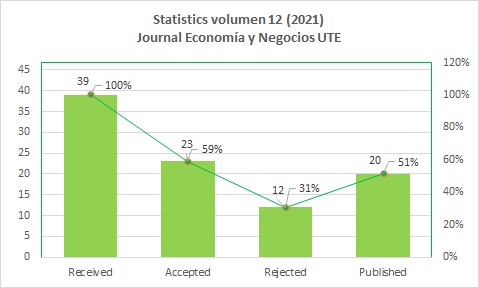Corporate Social Responsibility: Tool for the Development of the Enterprises?
DOI:
https://doi.org/10.29019/eyn.v8i1.324Keywords:
stakeholders, corporate social responsibility, CSR, entrepreneurship, Functionalist theory, Interactionist theoryAbstract
The objective of this article is to analyze CSR as a tool for the development of Entrepreneurship in Ecuador, taking a brief theoretical tour of the functionalist and interactionist paradigms, the first that roots in the positivist and evolutionary theories that have historically characterized the scientific thinking of the West; and the second also called conflict that is based on critical and libertarian theories rooted in Marxism, existentialism, anarchism, phenomenology, critical theory and the focus of human action. Corporate Social Responsibility, as part of the interactionist paradigm, renews the company's conception, granting it a broad and inclusive dimension, which goes beyond the mere economic question that perfectly incorporates the threefold aspect of sustainability: economic, social and environmental. Sustainable development is a goal to be achieved through the adequate implementation of a socially responsible enterprise model, in which the different interest groups, stakeholders, are the essential focus for management. In the case of Ecuador, 90% of the companies come from family enterprises, which in cases cited can be identified that Ecuadorian companies apply CSR as a good practice to ensure the development of socially responsible enterprises.
Downloads
References
Bilbao, a, & Pachano, S. (2002). Rasgos y actitudes de los emprendedores. Proyecto Andino de Competitividad. Retrieved from http://www.cid.harvard.edu/archive/andes/documents/workingpapers/razgosyactitu des/rasgos_actitudes_venezuela_competitiva.pdf
Coleman, J. S. (1990). Fundamentos de teoría social. (C. de I. Sociológicas, Ed.) (Primera en). Madrid- España. Retrieved from https://books.google.com/books?hl=es&lr=&id=Hev3oZ1vqSkC&pgis=1
Drakopoulou Dodd, S., & Hynes, B. C. (2011). The impact of regional entrepreneurial contexts upon enterprise education. Entrepreneurship & Regional Development, (December 2012), 1–26. http://doi.org/10.1080/08985626.2011.566376
Druker, P. (2001). La productividad del trabajador del conocimiento. Máximo desafío
2001. Harvard Business Review, Deusto2, p. 16. California. Retrieved from http://www3.mapfre.com/estudios/boletin/N3/pdfs/productividad.PDF
Friedman, M. (1966). The Methodology of Positive Economics*. Retrieved November
30, 2015, from http://www.sfu.ca/~dandolfa/friedman-1966.pdf
GEM, E. (2013). GEM. Retrieved October 16, 2015, from http://www.espae.espol.edu.ec/images/documentos/publicaciones/libros/reportegem2013.pdf
Izquierdo, R. J. S., & Vicedo, J. C. (2009). La Responsabilidad Social Empresarial en un contexto de crisis. Repercusión en las Sociedades Cooperativas. CIRIEC-España, Revista de Economía Pública, Social Y Cooperativa, (65), 7–31. Retrieved from http://www.ciriec-revistaeconomia.es/banco/6501_Server_y_Capo.pdf
Kliksberg, B. (2006). Ética Empresarial: ¿Moda o Demanda Imparable? Boletín
Bimestral De La Fundación Carolina, 4, 1–5.
LIDERES, E. C.-. (2015). Las empresas se integran a la responsabilidad social corporativa | Revista Líderes. Retrieved November 30, 2015, from http://www.revistalideres.ec/lideres/empresas-integran-responsabilidad-social- corporativa.html
Orrego, C. I. (2008). La Dimensión Humana Del Emprendimiento. Revista Ciencias Estratégicas, 16(20), 225–235. Retrieved from http://www.redalyc.org/articulo.oa?id=151312829001
Toca, C. (2017). Contributions to Social Responsibility, 393–408. Retrieved from http://www.revistas.unam.mx/index.php/rmcpys/issue/view/4553/showToc
Vives, A. (2013). Empleo y emprendimiento como responsabilidad social de las empresas. Journal Globalization, Competitiveness and Governability, 7(3), 16–33. http://doi.org/10.3232/GCG.2013.V7.N3.01
Downloads
Published
How to Cite
Issue
Section
Categories
License
Copyright (c) 2017 The Author

This work is licensed under a Creative Commons Attribution 3.0 Unported License.
The articles and research published by the UTE University are carried out under the Open Access regime in electronic format. By submitting an article to any of the scientific journals of the UTE University, the author or authors accept these conditions.
The UTE applies the Creative Commons Attribution (CC-BY) license to articles in its scientific journals. Under this open access license, as an author you agree that anyone may reuse your article in whole or in part for any purpose, free of charge, including commercial purposes. Anyone can copy, distribute or reuse the content as long as the author and original source are correctly cited. This facilitates freedom of reuse and also ensures that content can be extracted without barriers for research needs.
Creative Commons Attribution 4.0 International License
The Journal Economía y Negocios is distributed under a
Creative Commons Attribution 4.0 International (CC BY 4.0).

In addition, the journal Economía y Negocios guarantees and declares that authors always retain all copyrights to the original published works without restrictions [© The Author(s)]. Acknowledgment (BY): Any exploitation of the work is allowed, including a commercial purpose, as well as the creation of derivative works, the distribution of which is also allowed without any restriction.















